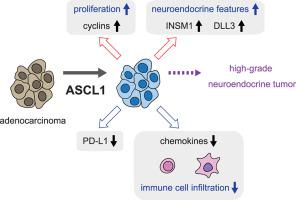Cancer Letters ( IF 9.7 ) Pub Date : 2020-06-10 , DOI: 10.1016/j.canlet.2020.06.002 Naoya Miyashita 1 , Masafumi Horie 2 , Yu Mikami 3 , Hirokazu Urushiyama 1 , Kensuke Fukuda 1 , Kazuko Miyakawa 1 , Hirotaka Matsuzaki 1 , Kosuke Makita 4 , Yasuyuki Morishita 5 , Hiroaki Harada 6 , Max Backman 7 , Cecilia Lindskog 7 , Hans Brunnström 8 , Patrick Micke 7 , Takahide Nagase 1 , Akira Saito 9

|
The master regulator of neuroendocrine differentiation, achaete-scute complex homolog 1 (ASCL1) defines a subgroup of lung adenocarcinoma. However, the mechanistic role of ASCL1 in lung tumorigenesis and its relation to the immune microenvironment is principally unknown. Here, the immune landscape of ASCL1-positive lung adenocarcinomas was characterized by immunohistochemistry. Furthermore, ASCL1 was transduced in mouse lung adenocarcinoma cell lines and comparative RNA-sequencing and secretome analyses were performed. The effects of ASCL1 on tumorigenesis were explored in an orthotopic syngeneic transplantation model.
ASCL1-positive lung adenocarcinomas revealed lower infiltration of CD8+, CD4+, CD20+, and FoxP3+ lymphocytes and CD163+ macrophages indicating an immune desert phenotype. Ectopic ASCL1 upregulated cyclin transcript levels, stimulated cell proliferation, and enhanced tumor growth in mice. ASCL1 suppressed secretion of chemokines, including CCL20, CXCL2, CXCL10, and CXCL16, indicating effects on immune cell trafficking. In accordance with lower lymphocytes infiltration, ASCL1-positive lung adenocarcinomas demonstrated lower abundance of CXCR3-and CCR6-expressing cells.
In conclusion, ASCL1 mediates its tumor-promoting effect not only through cell-autonomous signaling but also by modulating chemokine production and immune responses. These findings suggest that ASCL1-positive tumors present a clinically relevant lung cancer entity.
中文翻译:

ASCL1通过细胞自主信号传导和免疫调节在一部分肺腺癌中促进肿瘤进展。
achaete-scute复杂同源物1(ASCL1)是神经内分泌分化的主要调节剂,它定义了肺腺癌的一个亚组。但是,ASCL1在肺肿瘤发生中的机制作用及其与免疫微环境的关系主要未知。在这里,ASCL1阳性肺腺癌的免疫格局由免疫组织化学表征。此外,在小鼠肺腺癌细胞系中转导了ASCL1,并进行了比较RNA测序和分泌组分析。在原位同基因移植模型中探讨了ASCL1对肿瘤发生的影响。
ASCL1阳性肺腺癌显示CD8 +,CD4 +,CD20 +和FoxP3 +淋巴细胞和CD163 +巨噬细胞的浸润较低,表明存在免疫沙漠表型。异位ASCL1上调细胞周期蛋白转录水平,刺激细胞增殖,并增强小鼠的肿瘤生长。ASCL1抑制包括CCL20,CXCL2,CXCL10和CXCL16在内的趋化因子的分泌,表明对免疫细胞运输的影响。根据较低的淋巴细胞浸润,ASCL1阳性的肺腺癌表现出较低的CXCR3和CCR6表达细胞丰度。
总之,ASCL1不仅通过细胞自主信号传导,而且通过调节趋化因子的产生和免疫应答来介导其促肿瘤作用。这些发现表明,ASCL1阳性肿瘤表现出临床相关的肺癌实体。


























 京公网安备 11010802027423号
京公网安备 11010802027423号